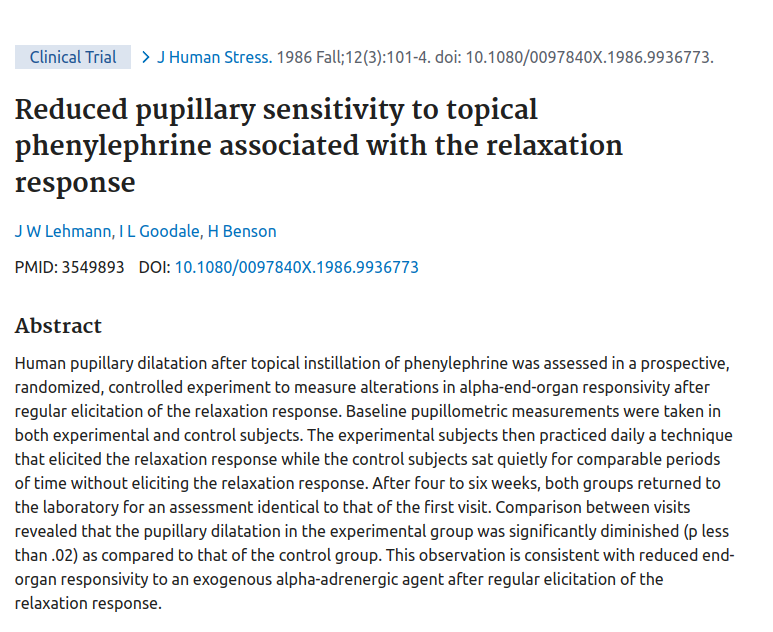Human pupillary dilatation after topical instillation of phenylephrine was assessed in a prospective, randomized, controlled experiment to measure alterations in α-end-organ responsivity after regular elicitation of the relaxation response. Baseline pupillometric measurements were taken in both experimental and control subjects. The experimental subjects then practiced daily a technique that elicited the relaxation response while the control subjects sat quietly for comparable periods of time without eliciting the relaxation response. After four to six weeks, both groups returned to the laboratory for an assessment identical to that of the first visit. Comparison between visits revealed that the pupillary dilatation in the experimental group was significantly diminished (p < .02) as compared to that of the control group. This observation is consistent with reduced end-organ responsivity to an exogenous α-adrenergic agent after regular elicitation of the relaxation response.
Reduced Pupillary Sensitivity to Topical Phenylephrine Associated with the Relaxation Response
Publication
Journal of Human Stress
Abstract
Web and Email Links
Related Listings
Journal
Journal of Human Stress
Human pupillary dilatation after topical instillation of phenylephrine was assessed in a prospective, randomized, controlled experiment to measure alterations in α-end-organ responsivity after regular elicitation of the relaxation response. Baseline pupillometric measurements were taken in both experimental and control subjects. The experimental subjects then practiced daily a technique that elicited the relaxation response while the control subjects sat quietly for comparable periods […]
Journal
NeuroReport
Previous research indicates that long-term meditation practice is associated with altered resting electroencephalogram patterns, suggestive of long lasting changes in brain activity. We hypothesized that meditation practice might also be associated with changes in the brain's physical structure. Magnetic resonance imaging was used to assess cortical thickness in 20 participants with extensive Insight meditation experience, which involves focused attention to internal experiences. Brai […]
Journal
Calmer
In light of World Sleep Day this month, this week’s guest post features Valerie Teh, Calmer’s Client Manager and Self-Care Practitioner, who shares her expertise on how to explore and embrace intelligent rest to enhance quality sleep and nurture your overall wellbeing.

